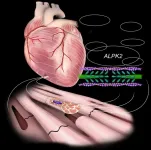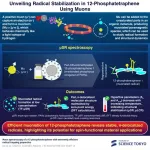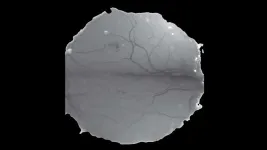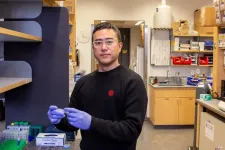(Press-News.org) An unusually high amount of poliovirus detections in several European countries in recent months has underscored the importance of keeping Europe polio-free, according to an editorial by European Centre for Disease Prevention and Control (ECDC) Director Pamela Rendi Wagner and World Health Organization (WHO) Regional Director for Europe Hans Kluge, which was published on Eurosurveillance. ‘A future without polio remains our goal, but it is by no means a certainty’, warn Rendi-Wagner and Kluge.
‘Every country must remain vigilant to detect the presence of polioviruses through sensitive surveillance systems, prepared to act quickly if any circulation is detected, and committed to sustain high vaccination coverage in every community every year until global polio eradication has been achieved,’ said Kluge and Rendi-Wagner. This reiterates the path laid out in the European Immunization Agenda 2030, the GPEI Polio eradication strategy, and the Global Polio Surveillance Action Plan.
Ongoing risk highlighted by recent detections
While polio has been a threat to the health and wellbeing of children for centuries, it is a mostly forgotten disease for the vast majority of people in Europe. Thanks to successful vaccination programmes, extensive surveillance and outbreak response, Europe has been polio-free since 2002.
However, the virus will continue to be imported into Europe as long as it circulates globally. Pathogenic poliovirus has been detected in at least one country in Europe every year from 2015 through 2022. More worryingly, vaccine-derived poliovirus type 2 was detected in 2024 in the wastewater systems of 14 cities in 5 countries, namely in Spain, Poland, Germany, the United Kingdom, and Finland.
These viruses are linked to a lineage that was first detected in Nigeria in 2020, and which has travelled to other 21 countries in Africa, causing outbreaks in 15 of them. Genetic sequencing analysis indicates that before it had been detected in Europe, the virus had been circulating for a year elsewhere.
There is no evidence that there has been widespread circulation of the virus in Europe due to these importations. However, these may and do lead to outbreaks if people who are unvaccinated are exposed to the virus, as recently seen in Tajikistan, Ukraine, Israel and the United Kingdom.
Public health action urgently needed
Therefore, Rendi-Wagner and Kluge emphasise the need to maintain high national vaccination coverage across all populations. While the five countries that detected polio virus in 2024 have maintained high immunization levels, they have also reported disparities in some communities, which remain vulnerable to infection as a result. ECDC estimates that 2.4 million children in the EU/EEA may not have received the course of vaccinations required for protection between 2012-2021, with an additional 600 000 children who may have missed their vaccinations in 2022-2023.
ECDC has published a Rapid Risk Assessment on these detections recommending priority actions to be urgently taken to prevent and curb possible transmission of polioviruses. WHO Europe has also published guidance to help countries identify, address and track disparities in vaccination levels.
Kluge and Rendi-Wagner have also underlined their commitment to cooperate closely to support national and local public health authorities in their efforts to curb the virus. This support includes technical guidance and resources for surveillance and outbreak response, facilitating data exchange and genetic sequencing of virus strains, and assisting in targeted risk communication and community engagement strategies to improve vaccination coverage. ‘Europe remains committed to do its part in the context of all relentless global efforts in this direction and has full capacity to do so successfully,’ said Kluge and Rendi-Wagner.
END
Urgent action needed to keep Europe polio-free, warn heads of ECDC and WHO Europe
An unusually high amount of poliovirus detections in several European countries in recent months has underscored the importance of keeping Europe polio-free
2025-01-30
ELSE PRESS RELEASES FROM THIS DATE:
A new therapeutic target for a lethal form of heart failure: ALPK2
2025-01-30
Tatsuya Yoshida, Mikito Takefuji, and Toyoaki Murohara in the Department of Cardiology, Nagoya University Graduate School of Medicine, identified an enzyme, alpha-kinase 2 (ALPK2) that is specifically expressed in the heart. They found that the enzyme may prevent a stiff heart through activating the gene TPM1 in heart muscle fibers. ALPK2 is a promising new therapeutic target for the treatment of heart failure, especially heart failure with preserved ejection function (HFpEF).
The number of heart failure patients is increasing worldwide. ...
Optimism can boost saving, especially for lower-income individuals
2025-01-30
WASHINGTON – Being optimistic about the future may help people save more money, and the effect appears strongest among those with lower incomes, according to research published by the American Psychological Association.
The study found that people who scored higher on measures of “dispositional optimism” -- the tendency to expect positive outcomes -- saved more money over time compared with their less optimistic peers.
The research was published in the Journal of Personality and Social Psychology.
"We often think of optimism as rose-colored glasses ...
Findings may lead to blood test to predict risk of postpartum depression
2025-01-30
Women who go on to develop postpartum depression (PPD) may have characteristic levels of neuroactive steroids, molecules derived from the hormone progesterone, in their blood during the third trimester of pregnancy, according to a new study by researchers at Weill Cornell Medicine and the University of Virginia. These molecules influence the brain’s stress response and emotional regulation.
The findings, published XX in Neuropsychopharmacology, suggest that this may provide a way to identify women at risk of PPD before ...
New insights on radical trapping in 12-phosphatetraphene uncovered
2025-01-30
Muon spin rotation (µSR) spectroscopy is a powerful technique that helps to study the behavior of materials at the atomic level. It involves using muons—subatomic particles similar to protons but with a lighter mass. When introduced into a material, muons interact with local magnetic fields, providing unique insights into the material’s structure and dynamics, especially for highly reactive species such as radicals.
In a new study, a team of researchers led by Associate Professor Shigekazu Ito, from the School of Materials and Chemical Technology, Institute of Science Tokyo, Japan, ...
Grossman wins 2025 Transatlantic Alliance Award in Endocrinology
2025-01-30
WASHINGTON—The Endocrine Society and the European Society of Endocrinology (ESE) are delighted to announce Professor Ashley Grossman, F.Med.Sci., as the winner of the 2025 Transatlantic Alliance Award.
Grossman is emeritus professor of endocrinology at the University of Oxford and a senior research fellow at Green Templeton College in Oxford, U.K. He also is a consultant endocrinologist at the Royal Free London and a professor of neuroendocrinology at Queen Mary University of London in London, ...
Girish N. Nadkarni, MD, MPH, CPH, named to leadership roles in AI and Digital Health at the Icahn School of Medicine at Mount Sinai
2025-01-30
New York, NY [January 30, 2025]—Girish N. Nadkarni, MD, MPH, CPH, an accomplished physician-scientist driving advances in artificial intelligence, has been appointed Chair of the Windreich Department of Artificial Intelligence and Human Health at the Icahn School of Medicine at Mount Sinai.
The department is the first of its kind at a U.S. medical school, underscoring Mount Sinai's leadership in integrating artificial intelligence (AI) into health care. Dr. Nadkarni will also serve as Director of the Hasso Plattner ...
A hearing aid for … your nose?
2025-01-30
Kaboom! The first time most of us hear the sound of an explosion is in the movies. Encountering the sound in the real world—even at a distance—has a profoundly different effect. Why? It’s all about context. How we react to sounds and other sensory stimuli depends on how they’re presented. We often don’t know how we’ll respond to something until we experience it. And the sensation is sometimes quite different from what we expected. So, the brain has to adjust quickly.
Cold Spring Harbor Laboratory (CSHL) Professor Florin Albeanu explains: “In ...
Borrowing nature’s blueprint: How scientists replicated bone marrow
2025-01-30
Hidden within our bones, marrow sustains life by producing billions of blood cells daily, from oxygen-carrying red cells to immune-boosting white cells. This vital function is often disrupted in cancer patients undergoing chemotherapy or radiation, which can damage the marrow and lead to dangerously low white cell counts, leaving patients vulnerable to infection.
Now, researchers at the University of Pennsylvania School of Engineering and Applied Science (Penn Engineering), Perelman School of Medicine (PSOM) and the Children’s Hospital of Philadelphia (CHOP) have developed a platform that emulates human marrow’s ...
Politically connected corporations received more exemptions from US tariffs on Chinese imports, study finds
2025-01-30
Research recently published in The Journal of Financial and Quantitative Analysis reveals that politically connected companies were significantly more likely to receive valuable exemptions from the tariffs imposed on U.S. imports from China during the Trump administration.
The authors, Veljko Fotak (SUNY Buffalo), Grace Lee (Fordham University), William Megginson (University of Oklahoma), and Jesus Salas, associate professor of finance (Lehigh University), found that companies that made substantial investments in political connections to Republicans prior to and during the beginning of the Trump administration were ...
Walk like a … gecko? Animal footpads inspire a polymer that sticks to ice
2025-01-30
A solution to injuries from slips and falls may be found underfoot — literally. The footpads of geckos have hydrophilic (water-loving) mechanisms that allow the little animals to easily move over moist, slick surfaces. Researchers in ACS Applied Materials & Interfaces report using silicone rubber enhanced with zirconia nanoparticles to create a gecko-inspired slip-resistant polymer. They say the material, which sticks to ice, could be incorporated into shoe soles to reduce injuries in humans.
Slips ...
LAST 30 PRESS RELEASES:
Evidence behind intermittent fasting for weight loss fails to match hype
How AI tools like DeepSeek are transforming emotional and mental health care of Chinese youth
Study finds link between sugary drinks and anxiety in young people
Scientists show how to predict world’s deadly scorpion hotspots
ASU researchers to lead AAAS panel on water insecurity in the United States
ASU professor Anne Stone to present at AAAS Conference in Phoenix on ancient origins of modern disease
Proposals for exploring viruses and skin as the next experimental quantum frontiers share US$30,000 science award
ASU researchers showcase scalable tech solutions for older adults living alone with cognitive decline at AAAS 2026
Scientists identify smooth regional trends in fruit fly survival strategies
Antipathy toward snakes? Your parents likely talked you into that at an early age
Sylvester Cancer Tip Sheet for Feb. 2026
Online exposure to medical misinformation concentrated among older adults
Telehealth improves access to genetic services for adult survivors of childhood cancers
Outdated mortality benchmarks risk missing early signs of famine and delay recognizing mass starvation
Newly discovered bacterium converts carbon dioxide into chemicals using electricity
Flipping and reversing mini-proteins could improve disease treatment
Scientists reveal major hidden source of atmospheric nitrogen pollution in fragile lake basin
Biochar emerges as a powerful tool for soil carbon neutrality and climate mitigation
Tiny cell messengers show big promise for safer protein and gene delivery
AMS releases statement regarding the decision to rescind EPA’s 2009 Endangerment Finding
Parents’ alcohol and drug use influences their children’s consumption, research shows
Modular assembly of chiral nitrogen-bridged rings achieved by palladium-catalyzed diastereoselective and enantioselective cascade cyclization reactions
Promoting civic engagement
AMS Science Preview: Hurricane slowdown, school snow days
Deforestation in the Amazon raises the surface temperature by 3 °C during the dry season
Model more accurately maps the impact of frost on corn crops
How did humans develop sharp vision? Lab-grown retinas show likely answer
Sour grapes? Taste, experience of sour foods depends on individual consumer
At AAAS, professor Krystal Tsosie argues the future of science must be Indigenous-led
From the lab to the living room: Decoding Parkinson’s patients movements in the real world
[Press-News.org] Urgent action needed to keep Europe polio-free, warn heads of ECDC and WHO EuropeAn unusually high amount of poliovirus detections in several European countries in recent months has underscored the importance of keeping Europe polio-free




